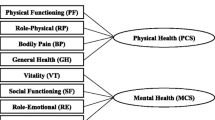Abstract
The objective of this study was to assess the validity of a Kiswahili translation of the SF-36 Health Survey (SF-36) among an urban population in Tanzania, using the method of known-groups validation. People were randomly selected from a demographic surveillance system in Dar es Salaam. The representative sample consisted of 3,802 adults (15 years and older). Health status differences were hypothesized among groups, who differed in sex, age, socio-economic status and self-reported morbidity. Mean SF-36 scale scores were calculated and compared using t-test and ANOVA. Women had significantly lower mean SF-36 scale scores (indicating worse health status) than men on all scales and scores were lower for older people than younger on all domains, as hypothesized. On five of the eight SF-36 scales, means were higher for people of higher socio-economic status compared to those of lower socio-economic status. People who reported an illness within the previous 2 weeks scored significantly lower on all scales compared to those who were healthy, as did people who said they had a disability or a chronic condition.
Similar content being viewed by others
References
Murray JL, Lopez AD. Evidence-based health policy-lessons from the Global Burden of Disease Study. Science 1996; 274 (5288): 740–743.
Murray JL, Lopez AD, eds. Global Comparative Assessments in the Health sector.Disease Burden, Expenditures and Intervention Packages. Geneva: World Health Organization, 1994.
World Health Organization. World Health Organisation Constitution. In: World Health Organization, eds. Basic Documents. Geneva: World Health Organization, 1948.
World Bank. World Development Report 1993: Investing in Health. Washington, DC: World Bank, 1993.
Ware JE, Gandek B, Keller SD et al. Evaluating instruments used cross-nationally: methods from the IQOLA Project. In: Spilker B, ed. Quality of Life and Pharmacoeconomics in Clinical Trials. Philadelphia: Lippiconcott-Raven Publishers, 1996: 681–692.
Anderson RT, Aaronson NK, Leplège AP, Wilkin D. International use and application of generic healthrelated quality of life instruments. In: Spilker B, ed. Quality of Life and Pharmacoeconomics in Clinical Trials. Philadelphia: Lippiconcott-Raven Publishers, 1996: 613–632.
Bullinger M. German translation and psychometric testing of the SF-36 Health Survey: preliminary results from the IQOLA Project. Soc Sci Med 1995; 41 (10): 1359–1366.
Ware JE, Sherbourne CD. The MOS 36-Item Short-Form Health Survey (SF-36). I. Conceptual framework and item selection. Med Care 1992; 30 (6): 473–483.
Ware JE, Keller SD, Gandek B et al. Evaluating translations of health status questionnaires: methods from the IQOLA Project. Int J Technol Assess Health Care 1995: 11(3): 525–551.
Jenkinson C, Coulter A, Wright L. The Short-Form 36 (SF-36) Health Survey questionnaire: normative data for adults of working age. BMJ 1993; 306: 1437–1440.
Sullivan M, Karlsson J, Ware JE. The Swedish SF-36 Health Survey: I. Evaluation of data quality, scaling assumption, reliability and construct validity across general populations in Sweden. Soc Sci Med 1995; 41(10): 1349–1350.
Wagner AK, Wyss K, Gandek B, Kilima P, Lorenz N, Whiting D. A Kiswahili version of the SF-36 Health Survey for use in Tanzania: translation and tests of scaling assumptions. Qual Life Res 1998; 7: 000–000.
Stewart AL, Hays RD, Ware JE. Methods of validating MOS health measures. In: Stewart Al, Ware JE, eds. Measuring Functioning and Well-being: The Medical Outcomes Study Approach. Durham, NC: Duke University Press, 1992: 309–324.
Wyss K, Whiting D, Kilima P et al. Utilisation of government and private health services in Dar es Salaam. E Afr Med J 1996; 73(6): 357–363
Kitange HM, Machibya H, Mtasiwa D et al. Outlook for survivors of childhood in sub-Saharan Africa: adult mortality in Tanzania. BMJ 1996; 312: 216–220.
Ware JE, Kosinski M, Gandek B. SF-36 Health Survey.Manual and Interpretation Guide. Boston, MA: The Health Institute, New England Medical Center, 1993.
Ware JE, Kosinski M, Keller SD. SF-36 Physical and Mental Health Summary Scales. Boston, MA: The Health Institute, New England Medical Center, 1994.
United Republic of Tanzania. Policy Implications of Adult Morbidity and Mortality.End of Phase 1 Report. Dar es Salaam: Ministry of Health, 1997: 209–232.
Behavioural Epidemiology Unit. South Australian Population Norms for the Short Form 36 (SF-36) Health Status Questionnaire. Adelaide; South Australian Health Commission, 1995.
McHorney CA, Ware JE, Raczek AE. The MOS 36-Item Short-Form Health Survey (SF-36): II. Psychometric and clinical tests of validity in measuring physical and mental health constructs. Med Care 1993; 31(3): 247–263.
Hemingway H, Nicholson A, Stafford M, Roberts R, Marmot M. The impact of socioeconomic status on health functioning as assessed by the SF-36 questionnaire: the Whitehall II study. Am J Public Health 1997 (September); 87(9):1484–90.
Author information
Authors and Affiliations
Rights and permissions
About this article
Cite this article
Wyss, K., Wagner, A.K., Whiting, D. et al. Validation of the Kiswahili version of the SF-36 Health Survey in a representative sample of an urban population in Tanzania. Qual Life Res 8, 111–120 (1999). https://doi.org/10.1023/A:1026431727374
Issue Date:
DOI: https://doi.org/10.1023/A:1026431727374



